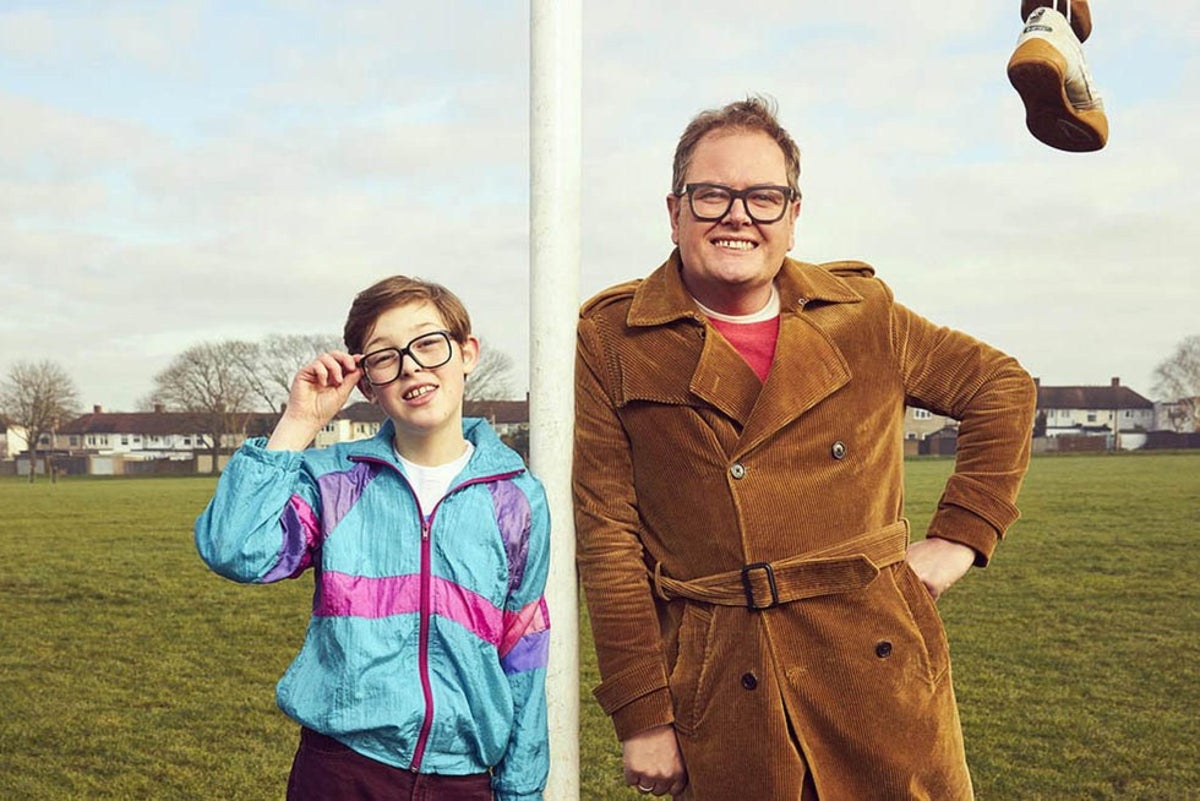
Alan Carr’s new autobiographical sitcom, Changing Ends, is that most joyous of things: a smart, inventive, honest and charming coming-of-age story. It’s also, in the case of Carr, the making of a national treasure.
It comes as no great surprise to learn that Carr, perhaps best known for his Chatty Man talk show on Channel 4, was as camp as a row of tents as a lad in the 1980s. But it takes the acting talent of another nascent national treasure, Oliver Savell, to capture the full fussy, theatrical, mincing Alan-ness of the junior Carr. Like Carr himself, who pops up with catty cameos and scene-stealing one-liners, Savell has a preternatural gift for performance. With his big gap teeth, oversized specs and effete ways, Savell, as they used to say in those deep husky-voiced Hollywood trailers, “IS” Alan Carr.
Savell’s Alan finally faces down his school bullies when he comes under the formative influence of his flamboyant new drama teacher, Miss Gideon (the equally fab Cariad Lloyd), who introduces herself in the school canteen by crawling around like a cat “licking her bits”. Like Alan’s mum (“the wind beneath my wings”), Miss Gideon loves Alan for what he is, and doesn’t mind his taste in blouses and calf-length boots. Instead, she encourages him to believe in himself, knowing that one day, the bullies who tried to make his life a misery will be pathetically claiming, “I know Alan Carr”. So Alan twirls his pink scarf around his school uniform, pops his oversized cerise earmuffs on, and strides out into the world.
But first we find Alan in the east Midlands in 1986, living with his father Graham (Shaun Dooley), the down-to-earth Geordie manager of fourth division Northampton Town Football Club, and his overprotective, chain-smoking mum Christine (Nancy Sullivan). Christine shares her husband’s state of denial that their theatrical little boy is… different, or “a bit half-rice, half-chips”, as a bitchy neighbour puts it. As he goes through puberty, (“it punched me in the face, left me with the eyesight of a mole, and the voice of an elderly lady”), Alan finds himself turning into an unwitting peeping Tom, his bird-watching binoculars trained on his best friend Charlie’s hairy, muscular dad (Harry Peacock). He’s spurned by Charlie due to his effeminate ways and teased for being “a four-eyed freak”. “For every pube I gained I lost a friend…ditched for being camp,” he mourns.
Changing Ends is satisfyingly rich in detail. There are plenty of knowing jokes, like when Graham orders his son to take down his poster of Prince because “he’s not a real man”, then Alan replaces it with one of George Michael. The football sticker graphics in the title sequences, the period details and the pop music (notably OMD’s “Enola Gay”) are also inspired. You can appreciate the love and care Carr and the team have poured into the project.
Light on its feet as much of it is, Changing Ends stands in the same class of sardonic memoir as the award-winning 1970s dramatisation of The Naked Civil Servant, which starred John Hurt as the notorious and eccentric Quentin Crisp. Crisp came to terms with his celebrity status later in life by declaring himself as “one of the stately homos of England”. Carr’s attitude to fame feels very similar. Beneath the unprepossessing exterior lies an acute intelligence, and plenty more ground to tread. Here’s hoping for a sequel.







